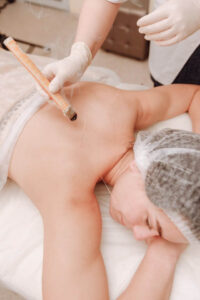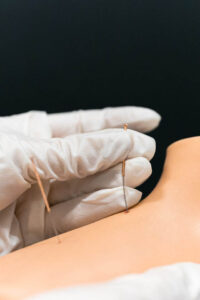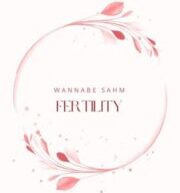
If you’re trying to conceive, you’ve probably heard (repeatedly!) that fertility naturally declines with age. But what if there was a way to improve egg quality, regulate hormones, and enhance blood flow to your uterus—without medication?
Enter acupuncture—an ancient practice that’s been used for thousands of years to support reproductive health. And modern science? It backs up what traditional Chinese medicine has known all along: Acupuncture can be a powerful tool for fertility—especially for women over 35.
Let’s explore how acupuncture works, what the research says, and why it might just be the missing piece in your fertility journey, as it was in mine. See the actions I took while trying to conceive at 41 here. 💕
How Acupuncture Supports Female Fertility
Acupuncture is a form of traditional Chinese medicine (TCM) that involves inserting thin, painless needles into specific points of the body. These points correspond to energy pathways (meridians) that influence reproductive health.
But what does acupuncture actually do for fertility?
📌 Science-Backed Benefits of Acupuncture for Fertility:
🔹 Improves blood flow to the uterus & ovaries – Supports implantation & egg health [1].
🔹 Balances reproductive hormones – Regulates estrogen, progesterone, and FSH levels [2].
🔹 Reduces stress & cortisol levels – Lowers anxiety, which can interfere with ovulation [3].
🔹 Improves ovarian function – Enhances follicle development for better-quality eggs [4].
🔹 Supports embryo implantation – Creates an optimal uterine environment for pregnancy [5].
Acupuncture isn’t just wishful thinking—it’s an evidence-based treatment that can help your body become more receptive to conception.
1. Acupuncture Increases Blood Flow to the Uterus & Ovaries
One of the biggest challenges women over 35 face is reduced blood circulation to reproductive organs.
📌 The Science:
- Research shows that acupuncture increases blood flow to the uterus, making it more receptive to implantation.
- Studies have also found that women who received acupuncture had higher uterine blood flow and improved endometrial thickness—key factors for conception [6].
🌿 Why This Matters for You:
- Better blood flow = better egg quality & a more welcoming uterine lining.
- Acupuncture helps the uterus “relax”, making implantation easier.
2. Acupuncture Balances Hormones & Regulates Ovulation
Hormone fluctuations can disrupt ovulation, making conception harder.
📌 The Science:
- Acupuncture helps regulate estrogen, progesterone, FSH, and LH, supporting a more balanced menstrual cycle.
- Studies have found that acupuncture significantly improved ovulation rates in women with irregular cycles.
🌿 Why This Matters for You:
- If you have irregular cycles, a short luteal phase (like I did), or PCOS, acupuncture may help support ovulation.
- If you’re trying to conceive naturally, predictable ovulation increases your chances of success.
3. Acupuncture Reduces Stress & Lowers Cortisol (Which Can Block Conception!)
Trying to conceive can be stressful. But did you know that stress hormones can actually interfere with fertility?
📌 The Science:
- High levels of cortisol (the stress hormone) can delay ovulation and reduce progesterone levels, making it harder to conceive.
- Studies show that acupuncture lowers cortisol levels and improves relaxation, helping to create a more fertility-friendly environment.
🌿 Why This Matters for You:
- If you’ve ever been told, “Just relax and it will happen”—this is the science behind it (even though it’s never that simple!).
- Acupuncture calms the nervous system, making your body more receptive to pregnancy.
4. Acupuncture Improves Egg Quality in Women Over 35
Egg quality is arguably the biggest factor in conception after 35, and acupuncture may help improve follicle development.
📌 The Science:
- Studies have found that acupuncture improved ovarian response in women undergoing IVF, leading to better-quality eggs [7].
- Acupuncture reduces oxidative stress, which can damage eggs over time.
🌿 Why This Matters for You:
- If you’re worried about egg quality, acupuncture may help protect and support ovarian function.
5. Acupuncture Can Boost IVF & IUI Success Rates
If you’re undergoing fertility treatments, acupuncture may enhance your chances of success.
📌 The Science:
- A study in The British Medical Journal (BMJ) found that women who had acupuncture before and after embryo transfer had a significantly higher pregnancy rate than those who didn’t.
- Acupuncture has been shown to reduce miscarriage rates in IVF patients by supporting progesterone levels and embryo implantation.
🌿 Why This Matters for You:
- If you’re doing IVF or IUI, adding acupuncture could significantly improve your outcome.
- Many fertility clinics now recommend acupuncture alongside medical treatments.
How Often Should You Get Acupuncture for Fertility?
💡 You should speak with your specialist about your individual needs, but most fertility specialists recommend:
✔️ 1-2 acupuncture sessions per week for at least 3 months before trying to conceive.
✔️ Continue once a week during your two-week wait after ovulation or embryo transfer.
✔️ If you get pregnant, continue through the first trimester to reduce miscarriage risk.
My Acupuncturist’s Tip: Keep your feet warm to encourage better circulation. Some nice comfy socks and a foot warmer did well for me!
Final Thoughts: Acupuncture as a Powerful Fertility Tool

Acupuncture isn’t just about sticking needles in your skin—it’s about supporting your body, reducing stress, and creating the best possible conditions for conception.
💖 Your body is capable.
💖 Your fertility journey is still unfolding.
💖 Hope is never lost—every small step brings you closer to your dream.
🌸 Have you tried acupuncture for fertility? Share your experience in the comments! 💕
Sources
- Acupuncture in Improving Endometrial Receptivity – NIH
- Clinical efficacy of acupuncture for diminished ovarian reserve: a systematic review and meta-analysis of randomized controlled trials – NIH
- Infertility and cortisol: a systematic review – NIH
- Effect of electro-acupuncture on ovarian function of women with diminished ovarian reserve – BMJ
- The effect of acupuncture on the day of embryo transfer on the in vitro fertilization outcomes – NIH
- Acupuncture in improving endometrial receptivity – NIH
- Acupuncture for Poor Ovarian Response: A Randomized Controlled Trial – NIH
